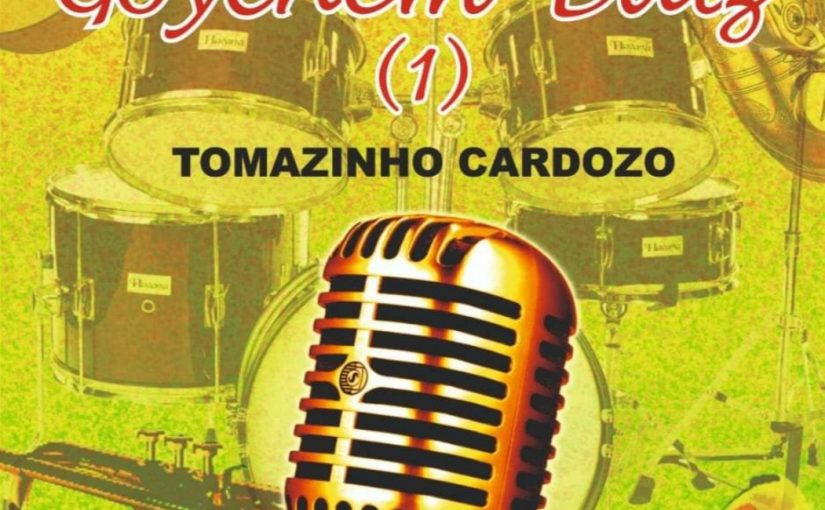BY AGNELO PIRES
ALL blue-blooded Goans who had the privilege of growing up in the company of radio transistors in the 70s and 80s, listening to the timeless songs by Alfred Rose and Lorna aired by All India Radio (Panaji), must have undoubtedly equally enjoyed bab Tomazinho’s songs which had the golden coating of popular Hindi movie songs and tunes of those times.
Songs like “Dekhlem hanven dekhlem” (1981), “Dista toxem nasta” (1980), “Niz mog” (1981), “Mon polle” (1983), not only took Tomazinho’s voice to every household of Goa but helped him carve a niche in the hearts and minds of diehard lovers of Konkani songs. After authoring over 35 books Tomazinho’s latest book has taken a lyrical flight. It’s a collection of 50 solos, 15 duets, 5 duos, 5 trios, 5 quartets and 20 choral songs in Konkani penned by him mostly for his numerous tiatrs and now framed into a book titled Kantar-Goenchem Diaz-1 – it is jewelled with songs from past to present. The book is printed under the scheme Preservation of Tiatr Literature of the Tiatr Academy of Goa and is published by Omor Prokaxon, Candolim. The cover design is by Willy Goes and the book is priced at Rs300. The book is dedicated to his late brother Joao de Deus Cardozo, who was his mentor and the lighthouse that guided his singing and writing skills safely into the harbour of popularity.
SPIRIT OF TIATR
HIGHLIGHTING the true spirit of popular Konkani drama known as tiatr, Tomazinho in his Foreword proudly says that kantar (song) is the soul of tiatr. Thereafter clearing the cloud of doubts regarding the various formats of songs that are used in tiatr. He has briefly spoken about the importance of all these formats that complete the circle of life of a tiatr. Tomazinho has written songs in all these formats and they now find a home in this book.
Just as the character and the costume of the Spiderman and the Superman are different so is the characteristic of the lyrics that flow from the pen of different lyricists, be it Gulzar, Shahir Ludhianvi, Les Reed, Eddie Miller or the one that germinated from the fertile soil of Goa, Tomazinho Cardozo.
The good, the bad and the ugly side of love and life, people and politics, society and sacrifice and harmony and happiness comes to life full circle in Kantar. This lyrical journey of love, life, social fabric, family and the hallmark of the writer’s politics exhibits emotional rawness from 1963 onwards and slowly donning the attire of maturity, as years go down with the setting sun.
Most of the verses are sharp like razor blade and address contemporary social issues with dark reality, at times make one think twice due to his piercing dry humour. “They praise you on your face and spew venom behind your back, they speak about unity but divide with their deeds.” (Dekhlem hanvem dekhlem). Songs like these strip our humanity to the bare nakedness of our misunderstanding of the meaning of life.
PAST & PRESENT
THE political lyrics remind readers that the past never lies too distant from the present. Songs like “Lokxai” (1980), “Zhuz ani Xanti” (1983), “Goeant Kitem Chol’lam” (1985) are proof by itself. They help make sense of this unfathomable world where what is spoken today is forgotten tomorrow, where selfishness and self-centric ideas become dragons devouring the happiness of ordinary people. And then there is the other self in some of us which fully knowing the consequences of choosing the wrong candidates in every election, still picks the rotten apple from the basket. The time has come to upset the applecart of those who sell false dreams and promise imaginary Burj Khalifa. This book is a needed voice for our perilous times.
Painting a rainbow-coloured picture of his love for Goa and Konkani language through “Sundor Mhoji Bhas” (1963) and through “Aicho Goenkar”(1985), Tomazinho Cardozo gives us a sense of constant being and becoming — the way a hibiscus flower opens to a world of endless beginnings. Songs like “Kande” (2009) unabashedly communicate the harsh truth of inflation. In women-centric songs like “Kirkire” (1980). “Porva Korina” (1978), and “Soiriko” (1977), the leap towards the significance of women in our society is visible, as pain is poised against courage. The narratives of the poems, 1964- “Mottorkar”, 1982- “Komblea Babanu”, 1982- “Ek Jiv Sadashiv” are varied and give poignant and sometimes even humorous glimpses into the lives of people of different strata of the society.
JOIN BANDWAGON
THROUGH Kantar Tomazinho has set an example hoping that other tiatrists will join the bandwagon. If not, it is hoped that the Tiatr Academy will fill the gap by compiling and publishing the best Konkani songs written by different tiatrists, that would be of high literary value.
Kantar will definitely come handy for aspiring Konkani singers, drama and film producers, besides budding lyricists, as some of the verses will prove to be the seeds from which a great lyrical poem sprouts. Those who would like to use the songs for remix or otherwise with tunes already set to musical scores by Nolvert Cota, the book is worth acquiring.
Grammatical and proof-reading mistakes which surface in the book could have been avoided had the author paid a little attention to detail and editing. English translation of all songs by Irene bai Cardoza deserves a pat on her back. In nutshell this collection embodies the shadow and the light of life itself and can beyond a shadow of doubt be said to be thought-provoking and engaging. Most of the songs linger in the mind long after the book is back on the bosom of the bookshelf!
(The writer is a freelance Konkani and English writer based in Panjim)
